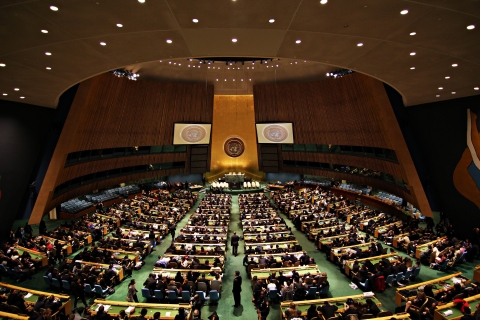There is a global movement to build a just and sustainable economy that prioritizes people and planet over profit. The following article was published in the January-February 2024 issue of NewsNotes.
One of the highlights of 2023 was the UN resolution on the social and solidarity economy. The resolution, adopted at the UN in New York last April, encourages member states and financial institutions to promote and support the work of cooperatives, associations, mutual aid societies, and others social and economic initiatives to achieve sustainable development.
“This pioneering resolution offers the tools to confront the great challenges that humanity faces – the reduction of inequalities and the protection of the environment,” said Yolanda Diaz, Spain’s minister of work and the social economy, at the meeting.
“An economy that is more democratic, more rooted in its territory and strong in the face of crisis is possible,” Ms. Diaz said. “The social economy is our today and our tomorrow.”
In a social and solidarity economy, communities are resilient and thriving thanks to the promotion and protection of local economies. Communities have a voice in how investments are structured. Greater attention is given to developing cooperatives, local businesses, and food systems, and to ensuring access to a social safety net and other initiatives that serve the common good.
The New Economy Coalition, an alliance of over 100 organizations building the solidarity economy in the United States, and the NonProfit Quarterly co-produced in December a series of case studies of “solidarity economy ecosystems that are returning wealth and building grassroots power” in cities across the United States. Called “Solidarity Economies: Building Communities of Power,” the articles highlight cooperatives and collectives in New Orleans, Buffalo, Los Angeles, Oakland and the DC metro area that have made contributions to decent work, the promotion of labor standards and rights, poverty alleviation, and social transformation and inclusion.
In the case study from Oakland, Black community organizers said they were inspired to think big by the experiences of cooperatives in Italy and Spain. They named Italy’s Marcora Law, passed in 1985, which allows laid-off and unemployed workers to pool their unemployment benefits to either take over a closing business or start a new one, as a way to rebuild a regional economy. They also named Spain’s Mondragón Corporation, which is the world’s largest worker cooperative network, with over 100 federated companies, a bank, and a university generating billions in revenue, as proof that a federation of cooperatives can compete in the global economy.
Inspired by these large-scale cooperative developments, the Oakland-based group decided in 2017 to create a regional association for Black cooperatives in California and beyond called Repaired Nations.
Thanks to grants from regional and national organizations, thirty members of the cooperatives that make up Repaired Nations traveled to Ghana in 2017 to learn more about their shared Pan-African vision and deepen their personal and business relationships. Since the trip, the regional association has birthed and welcomed more cooperatives.
One of the founders of Repaired Nations, Gregory Jackson, names the personal and professional growth, as well as the space to build sustainable careers, as the greatest benefits Repaired Nations has given the Black community. One cooperative leader said “We had a celebration on the 10 acres of land we co-purchased. Through cooperative values and belief in ourselves, we went from just throwing an idea out there to actually accomplishing a goal and knowing this way of being is possible.”
Photo of United Nations General Assembly Hall in the UN Headquarters, New York, by Basil D Soufi, US State Department, via Flickr.

